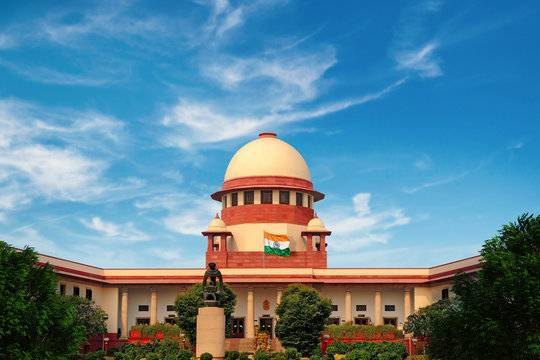
GAG LAWYERS -
GROVER & GROVER ADVOCATES

GAG LAWYERS -
GROVER & GROVER ADVOCATES

Right To Information Lawyer, RTI is a law that provides a right to information to every citizen of India. It was passed in 2005 and since then it has been used by citizens for transparency and accountability. RTI is an acronym for the Right to Information Act, of 2005 which was passed in India on October 3, 2005. The RTI Act allows anyone who has paid taxes or fees to access information from any public office or institution. It promotes transparency and accountability in governance, business, education, and healthcare services.
RTI is one of the most important legislations that have been passed in recent times because it helped people fight corruption by promoting transparency and accountability in governance, business, education, and health care services. RTI is a law that provides a right to information to every citizen of India.
It was passed in 2005 and since then it has been used by citizens for transparency and accountability. RTI is an acronym for the Right to Information Act, 2005 which was passed in India on October 3, 2005. The RTI Act allows anyone who has paid taxes or fees to access information from any public office or institution.
It promotes transparency and accountability in governance, business, education, and healthcare services. RTI is one of the most important legislations that have been passed in recent times because it helped people fight.
In 2006, the Reserve Bank of India published a circular telling banks to be more transparent in their dealings with customers under the RTI.RTI is an acronym for “right to information”. The act is a set of rules and guidelines on how people can request information from public authorities like government departments and certain state institutions, such as universities, hospitals or public schools.
The right to information also gives citizens the right to seek their own records from any institution that holds them (like a bank or other financial services). Banks are allowed to charge Rs. 100 for any document verification for those who are not able to read bank notices, but the rules does not specify how often a customer has to repeat the process. The rule will also help customers who change their mobile number and are unable to receive bank notifications on their old numbers as well as rid of erroneous charges as they have been already flagged by the customer or complained about.

RTI is a law that enables the public to seek information from the public bodies. It has been implemented in India since 2005 and it is considered as one of the most important laws in India. The RTI Act, 2005, was enacted by the Government of India to provide for transparency and accountability in governance and administration by ensuring access to information about government operations. The RTI Act provides a right of access to information under the following heads:
1. Right to know: Citizens have a right to know what their government or public body does or how it works.
2. Right against Unlawful Censorship: Citizens have an absolute right not be censored while accessing or obtaining information under this act.
3. Right against Frivolous Litigation: Citizens have an absolute right not be harassed while seeking or obtaining information under this act. .
4. Right against Evasion: Citizens have a right to obtain information from their government or public body even if it is not yet classified under this act. Citizens have a right to obtain information from their government or public body even if it is not yet classified under this act.

The RTI Act was passed in 2005, but it has not yet been fully implemented. There are still hurdles in its implementation in India, such as lack of awareness, lack of resources, and lack of political will.
1. RTI is the law that gives Indian citizens the right to access information held by public authorities. It has been a game-changer for transparency and accountability.
2. RTI is a powerful tool that helps expose corruption, and RTI requests have led to the suspension of several public servants and investigations into their alleged misconduct.
3. India’s RTI Act was passed in 2005 but was not fully implemented until 2009. The law gave Indian citizens the right to access information held by public authorities and has exposed corruption, led to investigations into the alleged misconduct of public servants, and suspended several government officials.
4. The RTI Act has been a game-changer for transparency and accountability in India. It is a powerful tool that helps expose corruption by allowing citizens to request information from all levels of government, resulting in the suspension of some government officials. Lack of awareness about the RTI Act is another challenge it faces. Even though India’s Constitution is highly respected and followed, the RTI Act has been widely viewed as an inconvenient imposition on government officials. Some of the issues with the RTI are that there are limits to what it can provide and a lack of awareness about its use. For example, RTI cannot be used in relation to matters related to national security or interception of communications under the Indian Telegraph Act.
5. The act also does not allow public access to private documents submitted in a lawsuit. It also lacks clarity over fees and penalties for not complying with requests made through it, which means that citizens may not know when they have been denied. RTI has been found to be successful at providing greater transparency in government; it also provides an avenue for citizens to hold the government accountable and protect individual rights. On the other hand, there is also concern that increased use of RTI may lead to a slippery slope of excessive requests and frivolous lawsuits.

RTI is the acronym for Right to Information Act, which is a law that gives the citizens of India the right to information about how their government functions. The RTI procedure in India is fairly easy and straightforward.
1. The first step is to file an application with the local government office where you live or work. It should be filed in person so that you can get a copy of your application and any supporting documents you need. To file an RTI, there are no specific fees associated with it other than a nominal fee for photocopying and postage if you have any documents that need to be submitted with your request.
2. The RTI procedure in India varies from state to state. For example, in Maharashtra, the applicant needs to send his or her application to the State Information Commission for approval. Once the commission approves it, you will receive a certificate of approval that says your RTI is approved.
3. However, this is not necessary in other states like Haryana and Rajasthan where permission can be given by a local government office on its own. In some cases it also depends on how publically accessible your information is as well. The process can take anywhere between ten days to two months depending on what documents are being requested.
4. Individuals who want to reunite with their family face a more lengthy process. The process can take anywhere between ten days to two months depending on what documents are being requested. In order for a family member to be reunited, they must provide the following:- A DNA sample- Fingerprints (three sets)- Two government-issued IDs that include the child in question- Proof of address in their home country, if the child and parent are from different countries- A copy of a birth certificate for the child The rights of children with immigration status in Canada are protected by Section 7 of the Charter Act. This means that any child who is not a Canadian citizen has basic rights that must be met before they can be deported. The Charter Act also states that children must not be separated from family members. To enforce this, immigration officials will only separate families if there is a legitimate reason to do so (such as documented abuse).

RTI is a tool that every Indian citizen has the right to use. It enables them to seek information about their rights, entitlements and obligations from any public authority.India has been using RTI for long time now but the law still lacks clarity on how to file a RTI in some cases.
The law requires that there should be an officer of the rank of Joint Secretary or above who is authorized to receive RTIs. But, this requirement is not clearly stated in the law and there are no clear guidelines on how it should be implemented. This article will discuss some of the legal issues associated with filing an RTI in India and provide solutions for these issues.
In India, the RTI Act has been used to request information from various public authorities. It has also been used as a tool for political activism. The first RTI was filed in 2005 by the Central Information Commission (CIC) on the issue of releasing budget data. In response to this RTI, the CIC received over 11 million records within 8 days. The first ever instance of filing an RTI was done in response to a government request in 1977 and it was approved by then Prime Minister Indira Gandhi on 9 March 1977.
This Act section also provides protection against disclosures that might harm the sovereignty and integrity of India, the security or defence of India, relations with foreign countries or lead to incitement to an offence. As of May 2018, at least 466 RTI applications have been filed in India that have led to the disclosure of information worth about 462.4 million Indian rupees (INR). The number is based on disclosures made by various public authorities and entities under RTI Act.

1. RTI stands for Right to Information Act which is a law that empowers every Indian citizen with the right to information about any public body. The Act was passed by Parliament in 2005 and it came into effect on January 16, 2006.
2. The RTI Act gives every citizen of India the right to make a request for information from any public authority or body. This means that citizens have the right to know how their government is spending their tax money and what they are doing with it. The RTI Act also states that citizens should be given prompt responses and should be informed of any decision taken by an authority or body within 30 days of making a request for information under the RTI Act.
3. The Right to Information Act, 2005 (RTI Act) is a law of India that seeks to provide for greater transparency in the decisions and actions of government authorities. The RTI Act created a framework for citizens to request information from public authorities, which must be provided within 30 days.
4. The Information Commission is the national authority that provides information to citizens and enforces compliance with the RTI Act. The IC is also authorised to give directions, as well as conduct investigations, recommend penalties for non-compliance and publicise its findings. The RTI Act has achieved significant success in improving transparency in India. In a survey conducted by Transparency International India in 2016, more than 80% of respondents said that they were satisfied with the effectiveness of this law.

Grover & Grover Advocates and Solicitors is a law firm that specializes in providing legal services related to various areas of law, including Right to Information (RTI) laws. They can help individuals, organizations, and businesses in filing RTI applications with the appropriate government authorities.
1. The lawyers at Grover & Grover Advocates and Solicitors can assist clients in drafting an RTI application that complies with the specific requirements of the law. They can help in identifying the correct government agency or authority to file the application with, and ensure that the application is framed in a way that is likely to result in the desired information being provided.
2. If an application is rejected or ignored by the government agency, Grover & Grover Advocates and Solicitors can assist in filing an appeal or complaint with the relevant appellate authority. They can represent clients before the Central Information Commission or State Information Commissions, as the case may be, and provide legal support throughout the appeal process.
3. Grover & Grover Advocates and Solicitors can help clients in enforcing their right to information by filing a writ petition in the High Court or Supreme Court, if necessary.

There have been several notable cases related to Right to Information (RTI) laws that have been heard by the Supreme Court and various High Courts in India. Some of the popular cases related to RTI include:
1. Central Board of Secondary Education (CBSE) case: In 2011, the Supreme Court ruled that answer sheets of students who appeared for exams under the CBSE are covered under RTI laws, and can be accessed by applicants seeking the same.
2. Girish Ramchandra Deshpande case: In 2012, the Supreme Court clarified that an individual’s personal information that has no relationship to any public activity or interest cannot be disclosed under RTI. However, details like service records, performance evaluation reports of public servants, etc. are disclosable.
3. Namit Sharma case: In 2013, the Delhi High Court directed all public authorities to upload on their website RTI applications, responses, and appeals and to update the same on a regular basis.
4. Subhash Chandra Agrawal case: In 2013, the Supreme Court ordered the disclosure of the names of account holders who have stashed black money in foreign banks. This ruling helped in bringing transparency in financial dealings and unearthing black money.
5. RBI vs. Jayantilal N. Mistry case: In 2015, the Supreme Court ruled that the Reserve Bank of India (RBI) cannot refuse to disclose information about banks under RTI, as this information is of public interest and affects the economy.